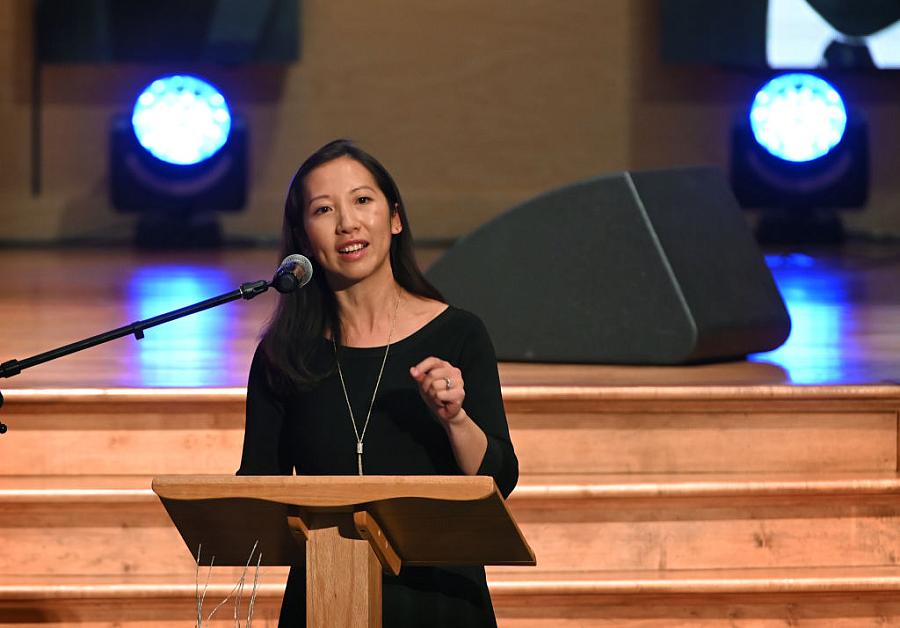Dr. Leana Wen shares her top pandemic lessons – and where reporters should go from here

Dr. Leana Wen (file photo).
(Photo by Lloyd Fox-Pool/Getty Images)
At the onset of the pandemic, Dr. Leana Wen wishes health journalists — herself included — had done a better job explaining that science changes as new research emerges. When the scientific consensus does change, as in the case of face masks, it makes sense to adjust public health policies accordingly.
“That’s just good science,” said Wen, a CNN and Washington Post contributor, told journalists at the Center for Health Journalism’s 2021 National Fellowship last week via Zoom. “Change is not only OK, it's expected.”
As the Delta-driven surge in COVID-19 cases unfolds, Wen highlighted some of the pandemic lessons we’ve learned so far and offered fresh reporting tips for handling the latest public health developments. She also discussed why the Biden administration should set health policy directly, instead of deferring to the Centers for Disease Control and Prevention, and how the time has come to adjust the country’s mask-wearing guidance yet again.
Wen emphasized five key lessons learned thus far in the pandemic.
- The pandemic didn’t create disparities — it unmasked existing issues. These inequities will be perpetuated unless we are specifically focused on reducing them. Wen’s concern is that we are not paying enough attention to public health at large, focusing instead on how to prevent the next pandemic. “Infection control is just the tip of the iceberg,” she said. For example, other public health issues such as opioid overdoses have worsened during the pandemic.
- The pandemic underscored that medical guidance isn’t one size fits all. “There’s a lot of gray and nuance in medicine,” she said. Even though public health officials might currently recommend against a booster shot for the overall population, some patients might benefit from one. Similarly, some vaccinated individuals with unvaccinated children might decide to wear masks indoors, despite the broader recommendation that it’s unnecessary. “Both of those are reasonable choices,” she said. “So much of what we’re doing now exists in that gray zone full of nuance.”
- A strong federal presence empowers and backs up local and state health, Wen said. Under the CDC’s current masking guidance for vaccinated people, local public health officials have struggled to defend mask requirements, even if they make sense in their particular community. “As soon as the CDC backtracked, that political cover disappeared,” she said.
- Success in public health is about getting people to heed what you’re saying. Under Biden, science alone appears to be guiding policy. In Wen’s view, that’s missing the bigger picture, which should include human behavior. In other words, establishing trust in public health matters, too. While they shouldn’t be partisan, public health officials don’t need to shy away from politics, she said. Effective health policy depends on so much more than science.
- It’s time we expand the public health ecosystem. Amid the criticism of public health officials, other health stakeholders have stepped up — from pediatricians to community leaders. “It's important for us to think about the role that everybody has in this ecosystem, because ultimately we're all part of fighting for the public's health,” Wen said.
Wen also gave journalists covering COVID-19 five pieces of reporting advice:
- Distinguish between clinical medicine, which is directed at the individual, and public health, which targets a population. The COVID-19 vaccine booster shot decision is an example of this. Public health guidance might differ from what’s best for any given person. Be careful with how you frame your coverage. Is a given instance of public health guidance for the whole country or for a specific individual?
- While journalists are covering lawsuits challenging vaccine mandates, consider another side to the mandatory vaccine debate. What about vaccinated people who are happy they can now go to work or school without masks and feel safe? Are their voices heard as well?
- Cover innovative moves in other countries. For example, consider France’s strict vaccination requirements in public spaces. Along those lines, explore what it means to have freedom. While one might make a choice to stay unvaccinated, few would agree it’s OK to spread a disease to other people’s unvaccinated children. “I think we need to reframe our definition of freedom,” she said, noting we don’t let people drive drunk.
- While it’s OK to report on breakthrough infections, make sure you understand the facts and overall context. What’s the denominator? Are they severe or mild infections?
- Be mindful that public health is not just about COVID-19. When the field of public health isn’t understood, it is easier to cut funding. Take a closer look at how public health funding is being used from the local to the national level and convey that. Are funds being used to bolster the workforce and infrastructure for the long run?
Wen understands why Biden isn’t changing the policy on masking for vaccinated individuals. Politically, the administration might not want to backtrack, especially after they just declared “independence from COVID-19.” Deferring to the CDC is not always practical, given the agency’s “lumbering slow approach,” she said. The CDC is a great peacetime organization, Wen said.
“But we’re at war, and the CDC is incapable of moving that quickly,” she said.
Biden needs to act urgently and reframe the assumption that vaccinated individuals don’t need to care whether others are vaccinated, too. Vaccines offer robust protection, but the defenses they afford can still be breached.
It’s time for a change in mask-wearing guidance, she said, noting that the vaccine is like a good raincoat.
“If you're in a drizzle, you'll be fine,” she said. “If it's raining hard, you will probably still be okay — it's a really good raincoat. But if you are in thunderstorms every single day, all the time, and now there's a hurricane, at some point you're going to get wet.”
**

